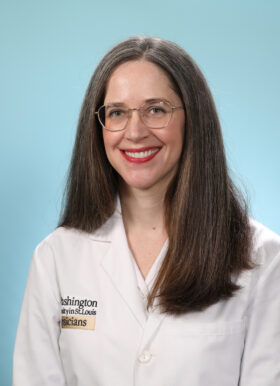For this Faculty Feature, we spoke with Suzanne Crumley, MD, Associate Professor, Pathology & Immunology in AMP with clinical interests in Cytopathology, Gynecologic Pathology, and Breast Pathology.
Tell us about your background. Where did you grow up, and when did you first become interested in science and medicine?
I was born at the University of Iowa Hospitals and Clinics when my father was a resident, and grew up predominantly in Cedar Rapids, Iowa. My father is an anesthesiologist, and mother is a physical therapist, so the healthcare field has always been familiar. I have always been a voracious reader; everything from fiction, non-fiction, and everything in between. If I could have chosen between two careers, it would have been something in science and medicine, or something related to books and libraries.
What is your career path?
I went to medical school and did a post-sophomore fellowship/pathology externship at University of Iowa. I then moved to Houston, Texas and did my AP/CP residency at Houston Methodist and fellowships in cytopathology and gynecologic pathology at MD Anderson. I had incredible mentors and peers in pathology in Houston, who taught me not only diagnostic skills, but also how to always strive for professional excellence, dig deeper, and take pride in my work. I was faculty for 7 years as a general surgical pathologist and cytopathologist at Houston Methodist. Now, I am excited to be at WashU to grow in an academic subspecialty practice and be closer to our extended family.
What are your favorite parts of your current role?
I enjoy the detective work of signing out cases and providing answers for patients and the clinical team. I also love teaching trainees and have a ton of fun at sign-out, as well as appreciate all the help the trainees and fellow faculty provide me starting at a new place. I enjoy the microcosm of subspecialty practice, with the subspecialized journal clubs, collegiality, and discussion of current and challenging issues in our fields. Everyone I have met has made me feel welcome and appreciated, including all the administrative support, cytotechnologists, PAs, and histotechnologists.
What is a memorable moment you’ve had while working in the department?
The single most memorable moment so far was hearing the DICER1 story from its very beginning to current day, by Pepper (Dr. Dehner) and Dr. Hill at the Missouri Society of Pathologists meeting. It is an important part of the institutional heritage of the pathology department at WashU. I feel privileged to hear it directly from those who have written and lived it; to know the nuances, challenges, and current-day impacts.
What special skills or talents do you have that people may not know about?
I am a mom to two daughters, 1.5 and 8 years old, and a Golden Retriever. I play the piano, classical guitar, and speak Spanish (study abroad in Ecuador and Argentina). I am a ‘retired’ avid runner, I ran in high school and for a few years in college (D3) and have run two full marathons. My personal best in the 1500 meters in high school was 5:06. I met my husband through friends, when we were both playing on the same Ultimate Frisbee team.
What are some of your favorite hobbies or activities?
Reading, of course! Also, eating good food, being outdoors, small group or individual discussions, and spending time with family.
What is your advice to aspiring people in your field?
Seek out knowledge wherever you can. Read, write, ask questions, and take ownership of your work and your career. Confidence and knowledge come from informed experience and are a lifelong pursuit. My best advice is first to see a lot of slides/cases, do self-directed and directed learning, edit your own work, and understand the implication of your diagnoses. I find a lot of purpose in my work in being useful. Clear and complete reports that answer the clinical questions help to achieve that purpose.
